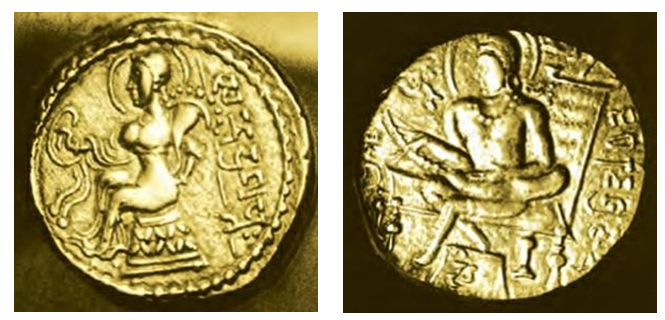Prashasti , Samudragupta's Prashasti, Genealogies, Harshavardhana and Harshacharita
Samudra Gupta was one of the most important ruler of the Gupta Dynasty. The details on his life was inscribed on the Ashokan Pillar at Allahabad. It was composed as a Kavya by Harisena, a poet and a minister in the court of Samudra Gupta.
This inscription is called the Prashasti, which means in praise of. Prashasti was also composed for Gautamiputra Shri Satakarni.
In samudra Gupta's Prashasti, he is described as a great warrior who had won many victories in the battle. He was described as close to God. Some coins were issued on which he is portrayed as playing the Veena.

Harisena described about 4 important rulers and samudra Gupta’s equations with them.
- The rulers of Aryavarta and it’s nine rulers were uprooted. The whole of the kingdom was conquered by Samudra Gupta.
- The rulers of Dakshinapatha- it’s 12 rulers were defeated who then surrendered themselves to SamudraGupta. However, he then allowed them to rule again.
- The inner circle of neighbouring states like Assam, Coastal Bengal, Nepal, and other gana Sanghas paid tribute to him, followed his orders, and attended his court.
- The rulers of Kushanas and shakyas, Srilanka submitted themselves to him and offered their daughters for marriage.
Genealogies
Some Prashasti mentioned about SamudraGupta's Great Grandfather, grandfather, father, mother. His mother Kumara devi, belonged to the Lichchhavi gana, while his father, Chandragupta, was the first ruler of the Gupta dynasty to adopt the grand title of maharaj-adhiraja, This title was also enjoyed by Samudragupta. His great grandfather and grandfather were simply given the title of maha-rajas.
Vikram Samvat
The era beginning in the 58 BCE is traditionally associated with Gupta king, Chandragupta II. He had founded it as a mark of victory over the Shakyas and assumed the title of Vikramaditya.
Harshavardhana and Harshacharita
We came to know about Harshavardhana from his biography Harshacharita, which was composed by Banabhatta, his court poet. The biography was composed in Sanskrit. The biography explains the genealogy of Harsha which also includes his becoming the King. Xuan zang spend quality time at his court and gave a detailed account of his experience.
Although he was not the eldest son to his father, he ascended the throne after his father and elder brother died. His brother in law was the king of Kanauj, who was killed by the ruler of Bengal. Harsha then took over the kingdom of Kanauj and proceeded an army against Bengal.
He conquered Magadha and Bengal too, but when he proceeded to Deccan , he was stopped by the Chalukya Ruler, Pulakeshin II.

 Indira Gandhi Memorial High School
Indira Gandhi Memorial High School
